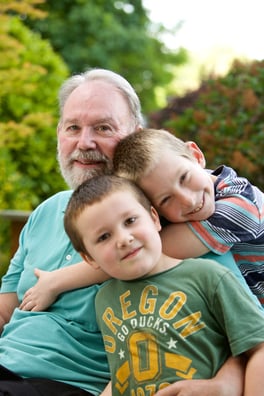When Down Becomes Up
Aging with a disability — everyone seems to be saying — is not an easy burden to carry, but is it all that different than the everyday coping behaviors we have to invent just to keep on persevering, no matter our age?
I remember a moment in my early 20s when I drove onto the UCLA campus looking for a place to park in the days before handicapped parking places. I was going to be late for an important class since no parking space was available within moderate rolling distance. I noticed all the students hurrying inside the buildings. They disappeared quickly, leaving the campus nearly empty, and I had not yet found a space.
I felt like giving up. How could I ever compete when it seemed I was always the odd man out? When I finally found a place, I took a deep breath and just sat there in my car. I had only been a wheelchair user for a year and already felt defeated. I started to feel sorry for myself. Then my memory tracked back to the day I was injured — lying in the wreckage of a small plane next to my friend, the pilot, who had just breathed his last breath. I was dizzy, felt sick, weak, and was certain I was about to die, too.
When I looked out on the empty campus, a peaceful feeling began to wash over me. I had survived, and I had my life to be grateful for and a chance to begin again. Suddenly the thought of being late to class seemed trivial, not in the least important. I began to notice the birds in the trees and a busy squirrel nearby. That was the day I decided that I had something no one else had, at least no one my age that I knew at the time. Instead of feeling isolated and left out, I began to feel confident in my ability to keep persevering, and to not get upset about things of little importance in the long run.

From that moment on, I had my touchstone, a place I could go in my mind to reawaken feelings of gratitude and good fortune, and no one could ever take it away from me. I began to slow down deliberately and concentrate on whatever I enjoyed, rather than what I felt obligated to do to stay in the race. What race? Who was watching? I was on a different track, my track, one that no one was familiar with but me. I had to make my own life somehow, and that meant I had to find not only what I enjoyed but what I could do independently, and do it as well as I could.
It turned out to be a life of writing, which means a life of paying attention to the details of not only my life, but the lives of others. I had to immerse myself in living for the moment in order to have something worthwhile to say.
Nothing has changed since that day, except I have aged, and am still learning. I still have down days, some of them related to activities I can no longer do due to loss of strength and endurance. I still have those moments when I think back to the day I thought I was dying. Or the day six years later when I thought I was losing my mind. Or the day I fell backwards in my chair and hit my head on hard pavement in the middle of the night. But after a day or two, or a week or a month, I find myself once again choosing to go on and feel grateful for the life I have been fortunate to live.
I don’t have a word that sums up what we all have as humans when we feel down and need to pull ourselves up and keep going, but if I were to choose one, it would have to be resilience. I believe we all have it. As humans we have the creative power of imagination and the ability to envision a path ahead. It is the path to true independence, and when we embrace all that we are and trust that it is a blessing, we can always rejoice in another day.
Join Our Movement
What started as an idea has become a national movement. With your support, we can influence policy and inspire lasting change.
Become an Advocate